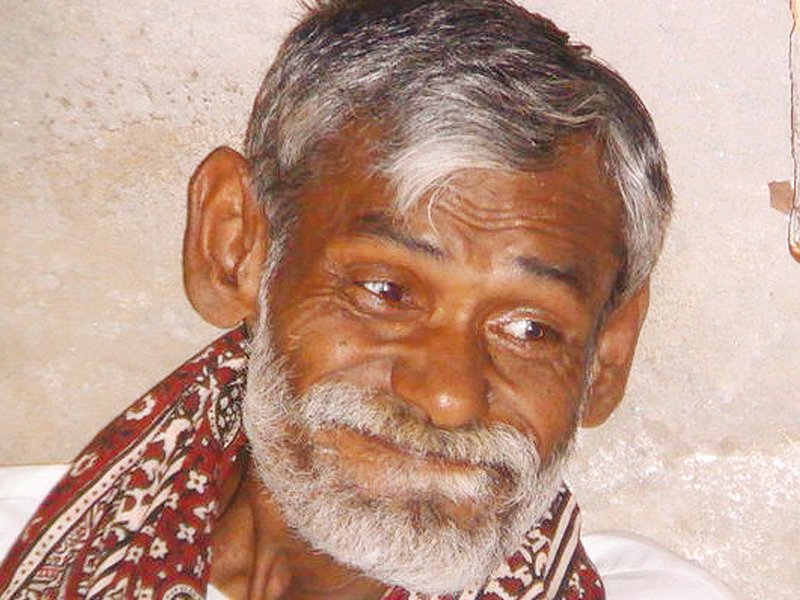
Shakir Shuja Abadi is not well. In fact, he has been bed-ridden since October. Unfortunately, nobody has noticed because he is one of the underrated godfathers of Seraiki poetry, and the voice of the underprivileged. Abadi is only sixty, but a stroke has taken away his voice. He can still write but his health has deteriorated over the years.
“When it comes to Seraiki poetry, Shakir Shuja Abadi is one of the biggest names. Almost every columnist in Seraiki has written extensively on his work. He is in dire shape,” says Nazar Farid Bodla, a student and an apprentice of sorts, who is now officially assigned by Shakir to recite his poetry.

Bodla tells The Express Tribune that it has been two years since the Punjab government stopped providing Abadi a stipend and he has not been able to work. Bodla says that Abadi’s house is small, and the family has no lands or supplementary income. According to Bodla, Abadi has been dependent on hand-outs from an MNA, or if a poetry recital takes place, he writes down poems for Bodla to recite.
“He is not well,” says Waleed Abadi, the younger son of Abadi. Waleed has returned home to be with his father, who in Seraiki folk-culture is a literary figure. Most regional languages are overshadowed by the prominence of Urdu or English, and Seraiki is no exception. Due to this, we forget the hidden geniuses that are yet to be discovered in the heart of our country.
Waleed says only a few friends and fans have visited regularly since his father has been bed-ridden. Shuja’s poetry is still published regularly in a newspaper, whenever the Shakir pens a thought. Most of his life’s work has been built out of experience and the process of life itself.
It is said that his poetry came from a dark place of struggle and uncertainty, because of a stroke that he suffered as a child. He managed to attend a local government school, from where he drop-out after the death of his grandmother.
Forced to work as fruit-seller, he was entrenched in the vicious cycle of making ends meet in Bhawalpur. Poetry was still not in the picture. He then moved to Karachi, where he worked two jobs both as fruit-seller and chowkidar.
“He was forced out of the workforce. He spent his life working, but his health and age didn’t allow it. Poetry came to him when he had nothing,” said Waleed, while his father sat next to him.
Abadi started to recite his thoughts at the local darbar, and by the early 90s he was considered a towering figure of Seraiki culture. His first proper Mushaira was held in 1986 and he then headlined the All-Pakistan Mushaira held in 1991. The last Mushaira before his childhood condition got worse was held in 1994, but he still recited and his following still stood strong.
His poetry is laced with beautiful prose, which seems to put forth riddles regarding the world and society. He discusses themes of honesty, poverty, inequality, and underdevelopment related to the region. His ability to surpass linguistic barriers and appeal to non-Seraiki speakers is very powerful.
There are several popular lines, such as Tu Mehnat Kar, Tay Mehnat da silla Jaane Khuda Jaane (Just work hard and reward for that hard work, only God knows what you will get.) or Tu dewa bal kay rak ja, hawa jaane khuda jaane (Light the lamp, and let the winds decide or fate decide).
It is unfortunate to see talent such as that of Abidi being wasted due to sheer indifference.
Published in The Express Tribune, January 7th, 2014.
Like Life & Style on Facebook, follow @ETLifeandStyle on Twitter for the latest in fashion, gossip and entertainment.
COMMENTS (13)
Comments are moderated and generally will be posted if they are on-topic and not abusive.
For more information, please see our Comments FAQ

1732225542-0/logan-(1)1732225542-0-165x106.webp)















shakir shuja abadi ... proud of saraiki wasaib
@ Khurram Awan, South Punjab dialects: It depends on how you look at it. These classifications and categorisations of today's Seraiki dialects into Western Punjabi or Landha Punjabi were done by Orientalist linguistics who worked on the Linguistic Survey of India project. They have been disputed by some linguistics working independently who bracketed some if not all dialects with Sindhi given the similarity in higher vocabulary and body of consonants (think of the relation between Pesianised Urdu and standard Persian). However, it's also true that regular, street-language is closer to North Punjabi but again, it depends which dialect you are using.
Even if the alphabet is derived from Shahmukhi, there are unpronounceable consonants which are absent in Shahmukhi, which are differentiated from regular consonants with a dot (eg, a dot below 'daal', a dot below 'bay', a dot below 'gaaf' and so on and so forth).
Ranjit Singh: He wasn't an invader of the Afghan/Persia/Turkic variety but he was conqueror nonetheless. Pathan families like Durranis etc did conquer Multan and adjoining areas in days gone by, killed and plundered (like the rest) but by the time Ranjit and British came, the descendants of those Pathan families had been acculturated and assimilated into local culture aka they had become locals like any Arain or Rajput. Those Pathans had nowhere to go when they were fought and booted out by the forces of Ranjit Singh.
Sorry for the typos in my previous post. Didn't re-read it. Anyway, to get back on topic, I do hope someone in the higher echelons of power will come forward to help a wonderful lyric poet of a language that's praised not only by its speakers but also outsiders for its sweetness (mithaas) and melancholy (dard).
@Jahangir: Well emotionally your comment will be right but factually and historically absolutely incorrect and irrational.
@Gibran Well you just summed up my first comment. But still i dispute that claim that Seraiki that is a former mixture of former South Punjab Diaelects is Closer to Sindhi than from Punjabi. The reason is that recent Seraiki is derived from Western Punjabi known as Landha Punjabi Langauge that is also known as Old Standardized West Punjabi. Also all Alphabets are derived from Shahmukhi style of language as well. Last but not least people of South Punjab must be thankful to Ranjit Singh. Do you know Durranis and Rabbanis killed scores of South Punjab people and captured their lands. Ranjit Singh took those lands away and give it back to locals. Still many Durrani, Rabbani and Niazi landlords in South Punjab are the same people who killed local farmers and snatched their lands. Ranjit Singh was you Savior from Afghan and Iranian origin ( So called Gailanis etc ) landlords not an Invader of any Kind.
@ Khurram Awan: You are right insofar as the name Seraiki is concerned. It's a new name given to a body of dialects (Multani, Derawali, Riyasti etc) from what is today South Punjab but these dialects have always be around and have developed organically (unlike modern Hebrew which was painstakingly developed as a new language). However, historically, these dialects have been closerr to Sindhi than Punjabi given the fact that the land comprising today's Seraiki speaking areas was never part of Punjab prior to Ranjit Singh's conquest.
Keeping this history in mind, the most-independence situation (alienation, poverty, lack of even development, North Punjab's hegemony) gave rise to a sub-identity in South Punjab which aggressively sought to categorise its dialects as a separate language worthy of recognition at the same level as Sindhi or Punjabi. That's how languages come to be, they evolve, they progress when works are produced in those languages. That's how English developed from Norman French. Yes, Londoners and the rest of England spoke a variant of Norman French as their "native" language for ages.
Even if Seraiki did not exist as a separate language before 200 years ago, it's a pretty separate and independent language today.
@Jahangir: Sir my family is living in South And as well as in North Punjab and i know my history very very well for atleast 700 years. No Western or Any Researcher outside of South Punjab have been able to prove any existence of Seraiki language before the 19th Century. Infact the word Seraiki is borrowed from Sanksikrit recently. Before the Partition of 1947 the dielect of Multan was known as Multani just like Northern Punjab dielects are known as Pahari, Doabi, Awankari.Dhani, Potohari etc.
The only written manuscripts that were found in Punjab dating back to 10th and 11th Century are written in ShahMukhi and Gurmukhi. Shahmukhi is still understood in villages of Punjab. SIr kindly provide me any manuscript or any evidence to support your fact in an unbiased manner and i will agree to your assumptions.
@Asim Jutt I have learnt history in a very very unbiased manner. I am talking about Reality. I dont believe on stories rather i read lots of books. My facts are absolutely correct in every manner. Kindly provide me Solid evidence of any Seraiki Civilization or any Written book or any written line or even the word Seraiki before the 1947 ?? Kindly provide me any mention of the Word Seraiki before 1947 and i will retract my statements.?
@Khurram Awan: lol really?? and do you you think the civilizations of harrapa and moen jo daro spoke? I is the most anceint language in subcontinent. Ever wonder why it is the only language spoken in all four provinces in Pakistan. Baloch, sindhi and even pathan in some areas speak seraiki in their homes. Seraiki is the progenitor language of sindhi and later punjab and other languages.
@Khurram Awan That was aggressive, wasnt it? You need to read some history again to get your facts corrected.
The dilemma of great people in country's like Pakistan. Jalib's wife passed away today. But his fake followers including those at the helm of Noora League did not attend her funeral in Lahore.
Finally something I can relate my originality to. Thanks for this, a job well-done by the writer.
Well the point is that Seraiki is a pretty new language and even those people who call themselves as Seraikis cannot exactly define it. Seraiki word itself came after 1947 and after 1960s the written language was developed. So it will take time for this newly created identity to be born out of Punjabi and once it will be then their distinct identity away from Punjabi diaelect will give recognition to their poets as well.